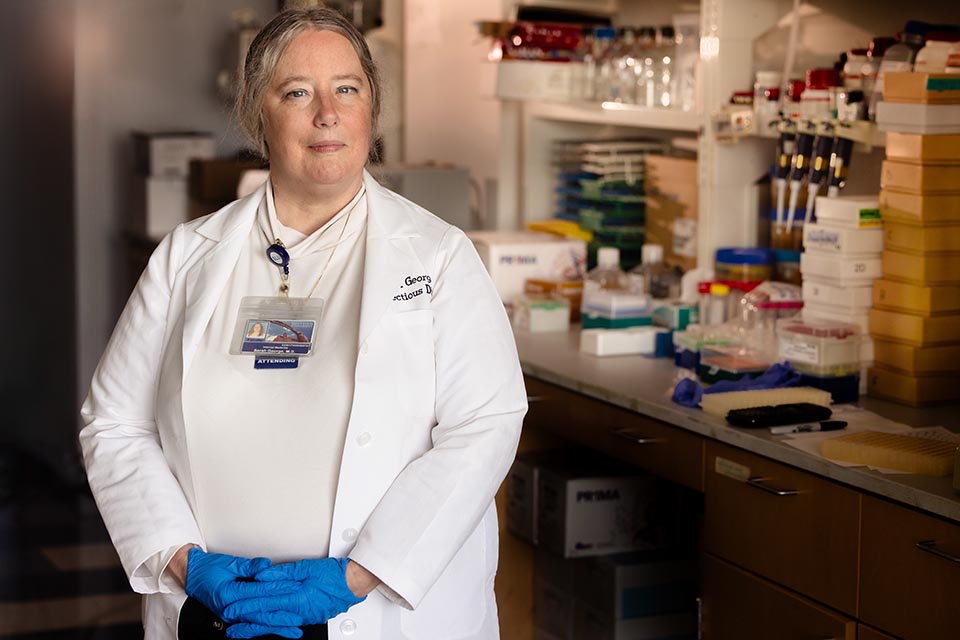Saint Louis University TIP Lab Kicks Off Project to Reduce Pickleball Injuries, Study Health Benefits
ST. LOUIS — Pickleball is the fastest-growing sport in the United States and offers a fun and social way to increase physical activity levels. With the explosion in participation has come a significant increase in pickleball-related injuries seen in U.S. emergency rooms. Still, this data does not offer an accurate picture of what types of injuries are most prevalent.
“Without accurate information on injuries, it will be difficult to develop strategies to prevent these injuries and allow people to access the benefits of increased activity in the safest way possible,” said Olu Owoeye, Ph.D., director of the Translational Sports Injury Prevention (TIP) Lab at Saint Louis University.

Olu Owoeye, Ph.D., director of the Translational Sports Injury Prevention Lab at Saint Louis University. Photo by Sarah Conroy.
The SLU TIP Lab is introducing SPIN, an acronym for Surveillance in Pickleball Players to reduce Injury burden, a multi-faceted, multi-year research project to address injury concerns with pickleball and study the health benefits that can be gained through pickleball participation.
SLU TIP Lab researchers aim to describe the most common pickleball-related injuries and devise data-driven prevention strategies through multiple phases of the SPIN Project. The initial phase is a participation and injury survey for pickleball players to complete online. This survey will provide the SPIN team with accurate information about how often participants play and the type and frequency of injuries that they are experiencing.
“We are recruiting 3,000 participants for this phase of the study from across all skill and age levels, age 18 and older, to give us the most accurate picture of pickleball injuries available to date,” said Owoeye, assistant professor of physical therapy at SLU.
Once this data has been analyzed, SLU TIP Lab researchers and expert partners will design prevention strategies to test for effectiveness and ease of adaptation. Additionally, the SPIN Project team will begin studies to determine what types of health benefits pickleball players can expect to gain from their pickleball play.
Owoeye explains, “We know that increased physical activity has many benefits, including lowering blood pressure, helping with maintaining a healthy weight and improving muscle strength, but because the increase in pickleball participation is so recent, we can’t accurately state how effective pickleball participation is at providing these and more benefits.”
The SPIN Project team partnered with PEAK Sport and Spine Physical Therapy, Dynamic Universal Pickleball Rating (DUPR), and the St. Louis Shock Professional Pickleball Club to help recruit participants for the injury survey. The SLU TIP Lab continues to seek additional partners to support this phase and additional phases of the SPIN project and the Umbrella Pickleball Project that incorporates trials to test the effectiveness of pickleball-specific injury prevention strategies and establish the health benefits of pickleball as a recreational sport.
“The recent burst in pickleball participation in the United States has provided a unique opportunity to study injuries and health benefits of a new activity almost from its inception,” Owoeye said. “The SPIN Project is positioned to provide a wealth of information to pickleball players, clubs, and equipment manufacturers on how to manage the risks and reap the benefits of pickleball most effectively going forward.”
Click here to participate in this research study. For more information, call Olu Owoeye at 314-977-8505 or email tip.lab@health.slu.edu.
Latest Newslink
- SLU Launches William L. Clay, Sr. Institute of Civic Engagement and Economic JusticeThe Clay Institute will provide immersive learning experiences and hands-on training that address the social and economic challenges facing the St. Louis region and the nation. Institute programming will be available to all students with an interest in civic engagement and democratic participation.
- SLU Research Explores Depression's Ripple Effect on DiabetesA study conducted by researchers at Saint Louis University found that patients with depression were more likely to have uncontrolled diabetes over time and that depression contributes to a heightened economic burden to diabetes management.
- SLU/YouGov Poll: Statewide Cell Phone Ban for Missouri Schools Popular with VotersGovernor Mike Kehoe has signed Senate Bill 68 into law, enacting a statewide ban on the use of personal electronic devices, including cell phones, tablets, and smartwatches, throughout the school day in Missouri public and public charter schools.
- SLU Vaccine Center Will Enroll Healthy Volunteers in Yellow Fever Vaccine Clinical TrialSaint Louis University's Center for Vaccine Development will enroll up to 70 adult volunteers in a clinical trial to study the safety elicited by a new investigational vaccine for yellow fever, a potentially deadly disease that is spread by mosquitoes. The research is funded by Sanofi Pasteur.
- Feser Joins Global Jesuit Assembly During First Week as SLU's PresidentAs he began his tenure as Saint Louis University's 34th president, Edward Feser, Ph.D., represented SLU as a delegate at the 2025 Assembly of the International Association of Jesuit Universities (IAJU).
- SLU Partnership with St. Louis Catholic Academy Middle School Education Yields Improved Outcomes One Year OnA partnership between Saint Louis University's School of Education's Herrmann Center for Innovative Catholic Education and St. Louis Catholic Academy has yielded improved test scores and student outcomes in the middle school population after its first year. The SLU School of Education provides resources to St. Louis Catholic Academy's middle school.













